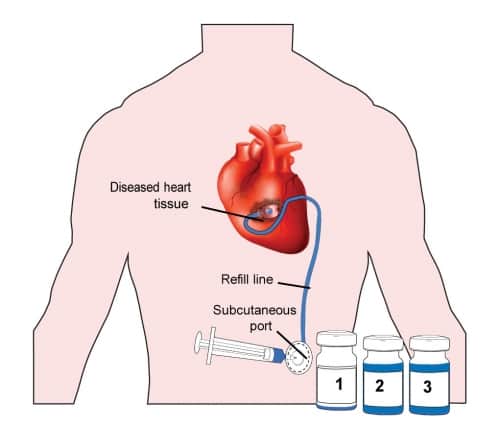Therapi heart implant localises drug delivery on damaged tissue
An Irish-American research consortium has developed a new heart implant known as Therapi that delivers medication precisely where it is required.


(Credit: Whyte et al)
After a heart attack, scar tissue that builds up around damaged blood vessels can precipitate ventricular or valve failure. Preventing this with medication requires either inaccurate systemic treatment - where doses must be kept low and the whole body is affected - or targeted drug delivery to the heart via multiple invasive surgeries.
The Therapi implant features a gelatin-based polymer reservoir where drugs can be stored and released locally to the damaged tissue. Attached via a surgical procedure, the reservoir can be refilled via a port on or just below the patient’s skin. The implant’s flat bottom consists of a semi-permeable membrane that can be adjusted to allow more drugs or larger materials to pass directly into the heart tissue.
Published in the journal Nature Biomedical Engineering, the research was led by Harvard University and featured input from MIT, Ireland’s Royal College of Surgeons, Trinity College Dublin, Advanced Materials and BioEngineering Research (AMBER) Centre, and National University of Ireland Galway.
Register now to continue reading
Thanks for visiting The Engineer. You’ve now reached your monthly limit of news stories. Register for free to unlock unlimited access to all of our news coverage, as well as premium content including opinion, in-depth features and special reports.
Benefits of registering
-
In-depth insights and coverage of key emerging trends
-
Unrestricted access to special reports throughout the year
-
Daily technology news delivered straight to your inbox










UK Enters ‘Golden Age of Nuclear’
The delay (nearly 8 years) in getting approval for the Rolls-Royce SMR is most worrying. Signifies a torpid and expensive system that is quite onerous...